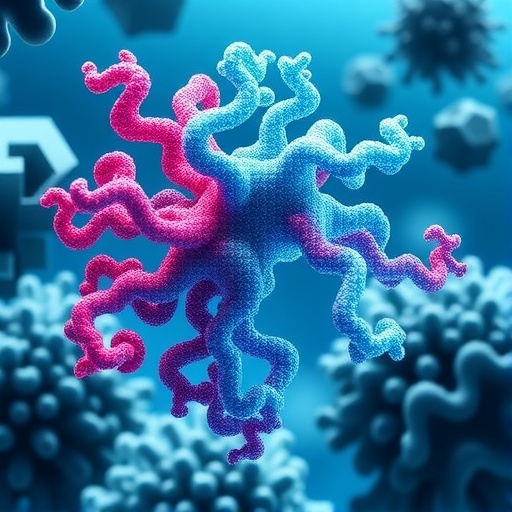Recent advancements in marine biotechnology are making waves, particularly with the groundbreaking research conducted by Caraka, Supardi, and Gio, along with their team. Their study, published in Discover Sustainability, delves into the innovative application of machine learning techniques for marine protein mapping, which plays a crucial role in enhancing the Prabowo–Gibran Marine Biodiversity Governance (MBG) program. This ambitious research aims to bridge the gap between scientific inquiry and sustainable practices, fostering a more robust understanding of marine ecosystems and their potential benefits.
A striking aspect of this research is its utilization of the Kolmogorov–Arnold network alongside ResNet, two powerful frameworks that facilitate complex data analysis and modeling. The researchers specifically focused on leveraging these technologies to decode significant patterns and relationships within marine proteins, which are fundamental building blocks of life in aquatic environments. Marine proteins exhibit a variety of functions and utilizations, ranging from human nutrition to biotechnological applications.
The Kolmogorov–Arnold network, a type of neural network structured to optimize function approximation, enables the researchers to manage vast datasets with unprecedented efficiency. By employing this network, the team can derive higher-dimensional representations of various marine protein characteristics, essentially translating intricate biological data into understandable formats. The implications of successfully implementing such predictive models can reshape our approach to marine resource management and conservation efforts.
Alongside this, the incorporation of ResNet—a deep learning framework designed to tackle image classification and recognition challenges—enables the extraction of critical features from marine protein structures. ResNet’s architecture effectively addresses the vanishing gradient problem, facilitating the training of deep networks by incorporating skip connections. This characteristic is particularly beneficial in marine biology, given the complex nature of protein structures and their inherent variability.
The researchers conducted extensive data collection, accumulating information on several marine species and their respective protein profiles. Once the data was gathered, the team trained the Kolmogorov–Arnold network in conjunction with ResNet, allowing them to create models that predict protein behavior with high accuracy. These models not only contribute to a deeper understanding of marine biodiversity but also enhance the feasibility of sustainable practices, directly aligning with the goals of the Prabowo–Gibran MBG program.
Their findings indicate that specific marine proteins can demonstrate considerable potential in addressing issues such as food security and environmental sustainability. By optimizing these biological resources, societies could tackle global challenges, including hunger and climate change. The research underscores the importance of innovative technologies and interdisciplinary approaches in finding solutions for the pressing issues faced by our planet.
Moreover, the study meticulously details the application of the Kolmogorov–Arnold network and ResNet for protein mapping, illuminating the processes and techniques used in harnessing machine learning. The algorithmic approach offers valuable insights into the classification of marine proteins based on various parameters, extending beyond traditional analysis methods prevalent in marine biology.
The results present a tremendous advancement in how scientists can visualize and predict the functions of proteins in marine organisms, opening doors to future applications in drug discovery and bioprocessing industries. The ability to characterize marine proteins accurately can facilitate significant progress in biotechnology, providing essential tools for innovation in health, nutrition, and sustainable practices.
As the scientific community continues to unravel the complexities of marine ecosystems, representation through machine learning will prove invaluable. The researchers’ work highlights the importance of collaboration between artificial intelligence and traditional biological research methodologies, showcasing the transformative potential of technology in understanding and conserving biological diversity.
Looking ahead, the research team envisions broadening the scope of their study, aiming to include more diverse marine species and expanding the range of protein functions explored. Such efforts could lead to a comprehensive database that could serve researchers worldwide, catalyzing further advancements in sustainable marine practices.
In conclusion, the innovative study by Caraka, Supardi, and Gio exemplifies the power of modern technology and interdisciplinary collaboration in addressing global challenges. Their findings contribute significantly to our understanding of marine proteins and demonstrate the vital role of machine learning in enhancing sustainability. As these technologies evolve, we may expect even more profound implications on conservation and marine resource management in the years to come.
This research not only highlights current scientific progress but also ignites discussions about the future of marine resource utilization, striking a balance between human needs and ecological preservation. Continuous exploration in this field will undoubtedly yield exciting revelations, guiding the next generation of marine biotechnology.
With the ongoing push for sustainable practices, studies like these indicate a promising trajectory for both marine science and technology, ultimately leading to innovative solutions capable of addressing the multifaceted environmental challenges we face globally.
Overall, Caraka and the research team’s commitment to advancing marine biodiversity through the integration of technology and sustainability marks a significant milestone in our mission to protect and understand our oceans. The research is a testament to the potential of combining biology with cutting-edge artificial intelligence to forge pathways toward a more sustainable future.
Subject of Research: Marine protein mapping using machine learning techniques.
Article Title: Using Kolmogorov–Arnold network and ResNet for marine protein mapping in support of the Prabowo–Gibran MBG program.
Article References:
Caraka, R., Supardi, K., Gio, P.U. et al. Using Kolmogorov–Arnold network and ResNet for marine protein mapping in support of the Prabowo–Gibran MBG program.
Discov Sustain 6, 1131 (2025). https://doi.org/10.1007/s43621-025-01880-9
Image Credits: AI Generated
DOI:
Keywords: Marine biotechnology, machine learning, Kolmogorov–Arnold network, ResNet, protein mapping, biodiversity, sustainability.




